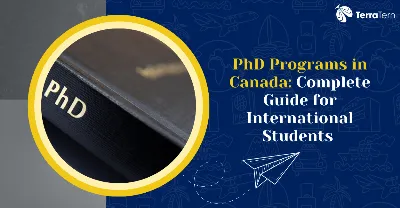Key Highlights
- What Are PhD Programs in Canada and Why Choose Them?
- How Long Do PhD Programs in Canada Take to Complete?
- What Are the Requirements for PhD Programs in Canada?
- Top 10 Universities Offering PhD Programs in Canada 2025
- How Much Do PhD Programs in Canada Cost?
- What Ph.D Scholarships and Funding Are Available in Canada?
- How to Apply for PhD Programs in Canada Step-by-Step?
- What are the Visa Requirements for Phd programs in Canada for Foreigners in 2025?
- Which PhD Programs in Computer Science Are Available in Canada?
- What Are the Best Affordable PhD Programs in Canada?
- What Career Opportunities Await PhD Graduates in Canada?
- Conclusion
PhD programs in Canada are one among the most prestigious and internationally recognised programs that provide advanced research degrees to international students. Canadian universities are recognised as among the world's leading in their field, and the country boasts an excellent research and development infrastructure, as well as active policies to accommodate a large number of international students, thereby making it an appealing location to pursue a doctoral degree.
What Are PhD Programs in Canada and Why Choose Them?

PhD programs in Canada are advanced doctoral studies that focus on original research conducted over a period of 3-6 years, culminating in the successful completion of a thesis. This work has contributed to the body of knowledge in a specific field.
-
Research Intensive: In Canada, PhD programs emphasise practical research and access to modern facilities and financial resources, and students often do research, with an emphasis on research discoveries; cases in point are the various Nobel Prize laureates of the University of Toronto, including insulin discoverer Frederick Banting.
-
International Recognition: These programs are internationally recognised, and three universities in Canada are in the top 50 of QS World University Rankings 2025 and are considered highly rated in all global rankings, which translates to more employment opportunities in any part of the world.
-
Multicultural Environment: A Multicultural environment can be provided in case of a large number of cross-cultural cooperation campuses, accommodating schooling as per the government of Canada statistics, which reported over 700,000 foreigners reside in this nation.
-
Bilingual Services: Provinces such as Quebec will offer bilingual services (French and English), where students have the option to learn either language and then be placed on the higher end of the academic ladder scale.
-
Global Reputation: Canadian PhDs have long been regarded as a quality product. The fact that the government is investing over CAD 15 billion yearly in research and development to assist its graduates meet the international standards (including medicine and AI) proves this point.
Also Read: MLC College Canada: Fees, Programs, Admission & Careers
How Long Do PhD Programs in Canada Take to Complete?
PhD programs in Canada usually last 3-6 years, and the length of your program will vary depending on your entry path, primary studies, and the program design. This period corresponds to the intensive research phase of doctoral studies, including coursework, examinations, and dissertation work. I will break it down step by step below, along with factors that affect completion time, fast-track paths, and an overview of a yearly structure.
Typical Duration Breakdown
PhD programs are full-time in Canada, but schedules may be flexible:
-
Post-Master's: Typically 4 years, working directly based on the graduate work.
-
Will be Direct-Baccalaureate to Bachelor: 5 years or less with extra reentry elements.
-
General Distribution: 3-6 years in the proportion of the total number of full-time students, and the mean age is about 4-6 years, regardless of major (sciences and humanities included).
-
Flexible-Time Flexibility: flexibility-time raised to 5-7 years and a maximum 8 years.
-
Records: Completion Statistics University of Toronto has 5 6 5.6-year median completion.
Factors that Influence the Time to Complete
Your PhD can be accelerated or lengthened by a few factors:
-
Milestone Pacing: Programs that include complete examinations or candidacy holds can take months; most programs require a candidacy period of 36 months.
-
Complexity of Research: Engineering or natural sciences could require more time to complete lab work, whereas humanities coursework could require less time.
-
Entry Route/Enrollment Type: Direct-entry will increase the time; flexible-time (for working professionals) will automatically adjust the path.
-
Supervision and Funding: The mentor within the company, along with the funding, would aid in staying on track, and even lapses would be converted into extensions.
-
Personal Circumstance: The schedule of the individual can be stretched to the limit based on whether it is part-time school or work experience, which can be 6-8 years.
Breakdown of Program Structure by Year
PhD programs have a staged process where milestones are clear to follow:
-
Year 1: Coursework (2.0 full-course equivalents, on average) and research planning.
-
Years 2-3: Pass comprehensive/qualifying exams (c. 24-30 months) and become a candidate (by 36 months at most).
-
Years 3-5: Complete leading research, write a dissertation, and collect data under the supervision of a committee.
-
4-6 Years: Complete the thesis, take departmental exams, and defend it orally.
-
Extension of Years Where Necessary: Extension of up to 10-11 years under exceptional circumstances, but must be covered during funded years (e.g. 4-5 years).
What Are the Requirements for PhD Programs in Canada?

These plans may help Canadian PhDs become more effective and flexible, enable overseas students to plan their time more efficiently, and address issues related to immigration and funding. Your field or university may have different dates, so be sure to visit their graduate calendar for confirmation. PhD programs in Canada incorporate extensive admission criteria designed to ensure that students possess the academic and research skills necessary to undertake doctoral-level studies. The following table is a summary of typical PhD program admission requirements in Canadian universities; it is based on the official university websites, as well as government portals and websites:
|
Requirement Type |
Description |
Common Minimum/Standard |
Examples/Notes |
|
Degree Prerequisite |
Thesis-based master's, |
degree or equivalent (thesis-based in most programs |
Master's degree or equivalent (thesis-based in most programs) |
|
Minimum GPA |
Competitive academic record in prior coursework |
Minimum GPA, Competitive academic history in prior coursework |
U Calgary U Toronto: 3.33.7/4.0 |
|
Language Proficiency |
English or French proficiency test (non-native speakers) required: |
IELTS: 6.5-7.0, TOEFL: 86-100 +, PTE: 59-61 |
Score requirement differs by institution/department. |
|
Transcripts |
Official college and university records of all past post-secondary institutions |
Transcripts: All issued transcripts shall be provided |
Must show degree completion and grades |
|
Research Proposal |
Intended research project, objectives and approach statement, |
1,500-10,000 words program-specific |
Statement of Significance, Feasibility, timeline, and alignment with supervisor. |
|
Letters of Recommendation |
Academic references in support of research capacity and academic potential |
2-3 letters required |
Should be recent, usually by professors/tutors. |
|
CV/Resume |
Academic, research, and professional experience, |
Publications, awards, and research activities are required in some format, |
Preferably an academic CV. |
|
Statement of Purpose |
Essay describing motivations |
background, and objectives of graduate study |
500-1,000 words usually |
|
Standardised Tests |
GRE/GMAT is occasionally required for specific programs or candidates |
Varies, often not mandatory |
but suggested to foreign applicants |
|
Other |
Other Writing sample, portfolio or subject-specific requirements |
Depends on discipline and department |
U Toronto CS: calculus, algorithms, systems pre-reqs |
Also Read: Which Colleges Accept 5.5 Band in Canada: Latest List
Top 10 Universities Offering PhD Programs in Canada 2025
According to the most recent rankings and all-encompassing details released by QS World University Rankings 2026 and Times Higher Education (THE) 2025, the following is the comparison table of the best universities in Canada to undertake a PhD program:
|
University |
Global QS Rank 2026 |
THE Rank 2025 |
Location |
Annual PhD Fees (CAD) |
IELTS Score |
Research Strengths |
Notable Features |
|
McGill University |
27 |
45 |
Montreal, QC |
$16,122 |
7.0 |
Biomedical sciences, AI, sustainability, physics |
12 Nobel laureates, 75+ research centres |
|
University of Toronto |
29 |
21 |
Toronto, ON |
$4,500-8,800 |
7.0 |
Computer science, medicine, and engineering |
The tri-campus system is the highest-ranked university in Canada. |
|
University of British Columbia |
40 |
41 |
Vancouver, BC, |
$3,000-$ 13,500: |
7.0 |
Climate/oceans, forestry, quantum sciences, |
TRIUMF lab partnership, research budget of $893M. |
|
McMaster University |
176 |
116 (tied 4th CA) |
Hamilton, ON |
$ 2200/term |
6.5 |
Health sciences, materials, evidence-based policy |
Research hospital network, U15 member. |
|
University of Alberta |
96 (tied 4th CA) |
116 (tied 4th CA) |
Edmonton, AB |
5940/yr |
6.5 |
Energy, AI, health, nanotechnology |
Energy, AI, health, and nanotechnology. Good industry collaboration, U15. |
|
Université de Montreal |
137 |
125 |
Montreal, QC |
$10,852/term |
6.0 |
AI (Mila), social sciences, la,w Bilingual environment |
Mila AI institute. |
|
University of Waterloo |
Top 10 CA |
163 |
Waterloo, ON |
$15,560/year |
7.0 |
Computer science, engineering, math |
Perimeter Institute proximity, quantum hubs |
|
University of Ottawa |
Top 10 CA |
191 |
Ottawa, ON |
$16,020/year |
7.5 |
Public policy, health, and engineering |
bilingual capital location, ties to government. |
|
University of Calgary |
Top 10 CA |
201-250, |
Calgary |
AB Variable |
6.5 |
Energy, health sciences, and environmental |
Co-op programs, research clusters |
|
Western University |
Top 10 CA |
201-250 |
London, ON |
Variable |
6.5 |
Business, health sciences, and engineering |
Research parks, health innovation centres |
How Much Do PhD Programs in Canada Cost?

PhD programs in Canada range from CAD $4,000 to CAD $16,122 annually for tuition fees, making them among the most affordable doctoral programs globally. The total cost of pursuing a PhD in Canada, including living expenses, typically ranges from CAD $16,000 to CAD $35,000 per year, depending on the university, location, and lifestyle choices.
PhD Tuition Fees Breakdown 2025-26
|
Cost Component |
Cost Range (CAD) |
Approx. Cost Range (USD) |
Notes |
|
Tuition Fees (International) |
4,000 – 16,122 annually |
$3,000 – $12,000 |
Varies widely by university and program (e.g., U of T charges CAD 9,240 including fees) |
|
Tuition Fees (Domestic) |
4,000 – 8,500 annually |
$3,000 – $6,300 |
Usually lower than international rates; some programs have equalised fees |
|
Living Expenses |
12,000 – 18,000 annually |
$8,800 – $13,200 |
Includes accommodation, food, transportation, health insurance, and personal expenses |
|
Additional Costs |
1,000 – 3,000 annually |
$750 – $2,200 |
Includes books, supplies, professional fees, travel, and incidentals |
Also Read: Provincial Nominee Program for Canadian Immigration
What Ph.D Scholarships and Funding Are Available in Canada?
PhD programs in Canada offer comprehensive funding opportunities through prestigious scholarships, guaranteed university packages, and research assistantships, ensuring financial support for both domestic and international doctoral students.
Major PhD Scholarships and Funding Opportunities in Canada:
-
Vanier Canada Graduate Scholarships: CAD $50,000 annually for 3 years - Canada's most prestigious doctoral scholarship administered by CIHR, NSERC, and SSHRC; open to both domestic and international PhD students, with final competition in 2025 as the program sunsets
-
Banting Postdoctoral Fellowships: CAD $70,000 annually for 2 years - Supports postdoctoral researchers transitioning to independent research careers; requires institutional endorsement and emphasises research excellence and leadership potential
-
University-Specific Guaranteed Funding: Major institutions provide comprehensive packages - University of Toronto offers a minimum CAD $40,000 annually, University of Alberta guarantees CAD $100,000 over 4 years (minimum CAD $25,000 initially), and McGill provides CAD $29,731-46,077 depending on residency status
-
Pierre Elliott Trudeau Foundation Scholarships: CAD $60,000 annually plus research and travel allowances for up to 3 years - Focuses on social sciences and humanities with emphasis on leadership and community engagement
-
Canada Graduate Research Scholarships: Doctoral (CGRS-D): CAD $35,000 annually for up to 3 years - Administered by tri-council agencies (CIHR, NSERC, SSHRC) for Canadian citizens and permanent residents pursuing PhD studies
-
Provincial and University-Specific Awards: Ontario Graduate Scholarship (CAD $15,000), University of British Columbia Graduate Fellowships (CAD $30,000), University of Saskatchewan Graduate Scholarships (up to CAD $20,000 over 36 months), and specialised programs like IDRC Research Awards (CAD $42,000-48,000) for development research.
How to Apply for PhD Programs in Canada Step-by-Step?

PhD programs in Canada require strategic planning and careful preparation throughout a comprehensive application process. International students should begin the application process at least 12 months in advance to ensure adequate time for document preparation, supervisor identification, and visa processing.
Essential 6-Step Application Process:
Step 1: Research and Identify Your Program (12-18 Months Before Start Date)
Research universities and PhD programs that align with your academic interests and career goals. Most Canadian universities require you to identify potential supervisors whose research matches your interests before applying.
Step 2: Prepare and Submit Required Documents (6-12 Months Before Deadlines)
Gather essential application materials, including official transcripts from all previous institutions, 2-3 academic letters of recommendation, a comprehensive CV highlighting research experience and publications, a compelling statement of purpose (800-1,000 words) explaining your research interests and career goals, and a detailed research proposal (1,500-10,000 words depending on program requirements).
Step 3: Complete Online Applications and Pay Fees (September-February)
Submit applications through university portals during the application window, typically opening in September-October with deadlines between December and February. Application fees range from CAD $125 for domestic students to CAD $145 for international applicants.
Step 4: Apply for Scholarships and Funding (September-October)
Submit scholarship applications simultaneously with program applications, as many prestigious awards like Vanier Canada Graduate Scholarships have September deadlines and require a university nomination.
Step 5: Prepare for Interviews and Selection Process (January-April)
Some programs require interviews with potential supervisors or admission committees to assess research fit and academic readiness. Prepare by thoroughly reviewing your research proposal, familiarising yourself with faculty members' recent publications, and clearly articulating how your research contributes to the field.
Step 6: Accept Offers and Apply for Study Permits (April-August)
Upon receiving admission offers, formally accept your preferred program and immediately apply for a Canadian study permit using your letter of acceptance. International students must demonstrate financial capacity (minimum CAD $22,895 for living costs plus tuition) and may require medical examinations depending on their country of origin.
Also Read: Top 10 In-Demand Skilled Jobs in Canada for Foreigners
What are the Visa Requirements for Phd programs in Canada for Foreigners in 2025?
International students pursuing Phd programs in Canada must obtain a study permit, which serves as the primary visa document for doctoral studies. New 2025 regulations require a Provincial Attestation Letter (PAL) alongside traditional requirements, including a valid acceptance letter from a Designated Learning Institution, proof of financial support (minimum CAD $22,895 annually for living costs plus tuition), a clean criminal record, medical examination (if required), and English proficiency (IELTS 6.5-7.0 or TOEFL 86-100+). The application process involves submitting documents online through IRCC, paying CAD $150 for the study permit and CAD $85 for biometrics, with processing taking 4-12 weeks depending on the country of origin.
Which PhD Programs in Computer Science Are Available in Canada?

Phd programs in Canada offer exceptional computer science doctoral education through world-class universities with cutting-edge research facilities and internationally recognised faculty. Canadian institutions provide comprehensive programs spanning artificial intelligence, machine learning, cybersecurity, and emerging technologies, positioning graduates for successful careers in academia and industry.
Here is a detailed comparison of the top 10 Computer Science Phd programs in Canada:
|
University |
QS Rank 2025 |
Duration |
Annual Tuition (CAD) |
Research Specializations |
Guaranteed Funding |
Notable Features |
|
University of Toronto |
13 |
4-5 years |
$4,500-$8,800 |
AI, machine learning, computer vision, computational biology, software engineering |
Up to CAD $40,000 |
Direct entry option, tri-campus system, Vector Institute partnership |
|
McGill University |
21 |
3-4 years |
$16,122 |
AI, robotics, quantum computing, bioinformatics, cryptography |
Research fellowships available |
Global top 0.5% ranking, bilingual environment, strong industry ties |
|
University of British Columbia |
26 |
4-6 years |
$3,000-$13,500 , |
AI, quantum computing, data science, NLP, computational biology |
Graduate fellowships CAD $30,000 |
TRIUMF lab access, ocean/climate research integration |
|
University of Waterloo |
34 |
4-5 years |
Variable |
AI for fintech, software engineering, HCI, and quantum computing |
Co-op integration funding |
Perimeter Institute proximity, strong entrepreneurship culture |
|
University of Alberta |
44 |
3-4 years |
$5,662 |
Machine learning, HCI, bioinformatics, and communication networks |
Minimum guaranteed CAD $25,000 |
Top 0.5% global ranking, AMII collaboration |
|
Université de Montreal |
110 |
3-5 years |
$10,097 |
AI (Mila), quantum computing, bioinformatics, software engineering |
All accepted students receive funding |
Mila AI Institute, bilingual research, Yoshua Bengio's lab |
|
McMaster University |
162 |
4 years |
$2,200/term |
Software engineering, algorithms, computational biology |
Research assistantships |
Top 1% global ranking, health sciences integration |
|
University of Guelph |
Not ranked in the top 200 |
4 years |
$6,000-$7,500 |
Cybersecurity, data science, HCI, bioinformatics |
Graduate scholarships |
Strong industry partnerships, IoT security research |
|
Carleton University |
Not ranked in the top 200 |
4 years |
$7,740 |
AI, cybersecurity, HCI, distributed systems |
Teaching/research assistantships |
Top 3% ranking, government research proximity |
|
Ontario Tech University |
Not ranked in the top 200 |
4 years |
~$7,000 |
Cybersecurity (specialised PhD), AI applications, policy |
University scholarships |
Canada's first cybersecurity PhD program |
Also Read: What Is GIC Canada For International Students? Learn Now
What Are the Best Affordable PhD Programs in Canada?
PhD programs in Canada offer exceptional value for money, with some of the world's most affordable doctoral education starting as low as CAD $576 annually. These cost-effective programs maintain high academic standards while providing comprehensive funding packages, making doctoral studies accessible to both domestic and international students. Based on the latest official university data and thorough cost analysis, here is a detailed comparison of the most affordable PhD programs in Canada:
|
University |
Annual Tuition (CAD) |
QS Ranking 2026 |
Duration |
Available Funding |
Total Annual Cost |
Key Advantages |
|
University of Saskatchewan |
$576 - $5,436 |
340 |
4-6 years |
Graduate scholarships up to $20,000 |
$12,000 - $18,000 |
Lowest tuition in Canada; equal fees for international students |
|
University of Calgary |
$4,319 |
198 |
4-6 years |
Graduate scholarships and fellowships |
$16,000 - $20,000 |
Top 200 global ranking with extremely low fees |
|
Memorial University of Newfoundland |
$6,390 |
661-670 |
3-5 years |
Graduate assistantships available |
$18,000 - $22,000 |
One of Canada's most affordable universities with strong research programs |
|
University of Prince Edward Island |
$2,363 - $7,815 |
1479 |
4-6 years |
Scholarships and work-study programs |
$14,000 - $19,000 |
Extremely low starting tuition with personalised education |
|
Simon Fraser University |
$6,075 |
319 |
4-6 years |
Research assistantships and grants |
$18,000 - $24,000 |
Top 350 global ranking with moderate fees |
|
University of Northern British Columbia |
$2,548 - $8,659 |
1251 |
4-6 years |
Research funding opportunities |
$15,000 - $22,000 |
Specialised programs with very affordable tuition |
|
Brandon University |
$7,000 - $10,304 |
Not Ranked |
4-6 years |
Financial aid and scholarships |
$17,000 - $22,000 |
Small class sizes with personalised attention |
|
University of Winnipeg |
$2,500 - $16,692 |
Not Ranked |
4-6 years |
Management program scholarships |
$14,000 - $28,000 |
Online and on-campus affordable options |
|
University of Toronto |
$6,500 - $9,000 |
29 |
4-5 years |
Guaranteed minimum $40,000 funding |
Net positive with funding |
Top global university with exceptional funding packages |
|
University of British Columbia |
$3,000 - $8,500 |
38 |
4-6 years |
Graduate fellowships up to $30,000 |
$15,000 - $25,000 |
World-class education with TRIUMF lab access |
What Career Opportunities Await PhD Graduates in Canada?

Phd programs in Canada prepare graduates for exceptional career opportunities across diverse sectors, with strong employment outcomes showing 95% employment rates within two years of graduation and salaries averaging CAD $92,912 annually.
-
Academia and Research Institutions: 19% of Phd graduates secure tenured or tenure-track faculty positions with salaries ranging from CAD $70,000-$120,000+, while 45% work in broader academic settings, including postdoctoral research, lecturing, and research administration across universities and government research facilities
-
Private Industry Leadership: 27-29% of PhD graduates work in private sector roles with engineering, computing, and statistics graduates showing 43% industry employment rates; positions include research scientist, data scientist, AI specialist, and R&D director with salaries ranging from CAD $90,000-$150,000+ annually
-
Government and Public Sector: 12% of Phd graduates work in public sector positions, including policy analysis, scientific advisory roles, and positions at national laboratories with salaries ranging from CAD $80,000-$130,000, offering stable career paths in evidence-based decision making
Also Read: Why Choose Canada For Study
Conclusion
Phd programs in Canada represent an exceptional opportunity for both domestic and international students seeking world-class doctoral education combined with outstanding career prospects and comprehensive financial support. With over 100 research-intensive universities, Canada welcomes more than 20,000 new PhD candidates annually, establishing itself as a global leader in graduate education and research excellence.
Contact TerraTern for more information on PhD Programs in Canada: Complete Guide for International Students 2025.








